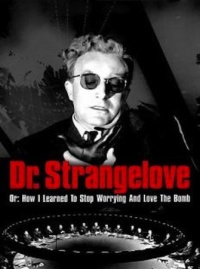Difference between revisions of "Dr. Strangelove (1964)"
(Created page with "200px|thumbnail|left === Timeless political satire === Stanley Kubrick’s Dr. Strangelove, or How I Learned to Stop Worrying and Love the Bo...") |
|||
| Line 1: | Line 1: | ||
[[File:1964 Dr.Strangelove.jpg|200px|thumbnail|left]] | [[File:1964 Dr.Strangelove.jpg|200px|thumbnail|left]] | ||
| − | === Timeless | + | === Timeless Political Satire === |
Stanley Kubrick’s Dr. Strangelove, or How I Learned to Stop Worrying and Love the Bomb, is rightly considered amongst the best comedies in the history of the silver screen. Coming in the midst of the Cold War, and released a year before the inception of the conflict in Vietnam, the film’s unrelenting satire contains a visceral message that is deeply serious and perceptive with regards to the mad military mindset of the time. In the US, there was a widespread belief that the Soviet Communists were attempting to poison the water supply with fluoride, and the film pours scorn on this idea. Instead, it seeks (successfully) to examine, and ridicule, the militarized approach to international relations that was prevalent in the US at the time - due in part to the assassination of John F. Kennedy - as well as the unquestioned validity of this approach. Despite the bold satire that underscores the entire narrative, the message advocated by Kubrick is quite clear: warfare should be viewed as a last resort. In its place, Kubrick seems to suggest that a policy of diplomatic cooperation would better serve the individual and collective interests of all parties. | Stanley Kubrick’s Dr. Strangelove, or How I Learned to Stop Worrying and Love the Bomb, is rightly considered amongst the best comedies in the history of the silver screen. Coming in the midst of the Cold War, and released a year before the inception of the conflict in Vietnam, the film’s unrelenting satire contains a visceral message that is deeply serious and perceptive with regards to the mad military mindset of the time. In the US, there was a widespread belief that the Soviet Communists were attempting to poison the water supply with fluoride, and the film pours scorn on this idea. Instead, it seeks (successfully) to examine, and ridicule, the militarized approach to international relations that was prevalent in the US at the time - due in part to the assassination of John F. Kennedy - as well as the unquestioned validity of this approach. Despite the bold satire that underscores the entire narrative, the message advocated by Kubrick is quite clear: warfare should be viewed as a last resort. In its place, Kubrick seems to suggest that a policy of diplomatic cooperation would better serve the individual and collective interests of all parties. | ||
[[Category: Film as Cultural Diplomacy]] | [[Category: Film as Cultural Diplomacy]] | ||
Latest revision as of 13:21, 23 October 2014
Timeless Political Satire[edit]
Stanley Kubrick’s Dr. Strangelove, or How I Learned to Stop Worrying and Love the Bomb, is rightly considered amongst the best comedies in the history of the silver screen. Coming in the midst of the Cold War, and released a year before the inception of the conflict in Vietnam, the film’s unrelenting satire contains a visceral message that is deeply serious and perceptive with regards to the mad military mindset of the time. In the US, there was a widespread belief that the Soviet Communists were attempting to poison the water supply with fluoride, and the film pours scorn on this idea. Instead, it seeks (successfully) to examine, and ridicule, the militarized approach to international relations that was prevalent in the US at the time - due in part to the assassination of John F. Kennedy - as well as the unquestioned validity of this approach. Despite the bold satire that underscores the entire narrative, the message advocated by Kubrick is quite clear: warfare should be viewed as a last resort. In its place, Kubrick seems to suggest that a policy of diplomatic cooperation would better serve the individual and collective interests of all parties.
